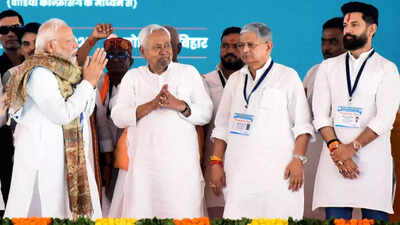
Senior BJP leaders including Dharmendra Pradhan and Nityanand Rai, accompanied by Bihar Deputy Chief Minister Samrat Choudhary and state minister Nitin Nabin, held late-night consultations at the residence of JD MP Sanjay Jha in a last-ditch attempt to resolve the impasse, departing only around 9:30 pm. No resolution had been reached by then.
Inside the alliance, friction has arisen over JD’s continued allocation of tickets to its preferred candidates, despite absence of a formal constituency-wise agreement with BJP. JD leaders are understood to have received assurances for ticket allocations in phase-one constituencies during deliberations at the home of Chief Minister Nitish Kumar; however, the precise distribution remains unsettled.
Analysts believe this breakdown reflects deeper shifts in the internal balance of power within the NDA. For the first time, the two principal partners are set to contest equal numbers of seats—a marked departure from earlier elections in which JD was granted a larger share. That parity has reportedly left the BJP unwilling to concede ground in certain strongholds historically held by JD, while the latter insists on maintaining influence in specific districts.
Smaller allies within the NDA, such as the Lok Janshakti Party, had earlier been allocated 29 seats as part of the broad formula. Hindustani Awam Morcha and Rashtriya Lok Morcha were allotted six seats each. Those allocations, though OKayed by the BJP central leadership, have not prevented unease within the coalition, especially given the uncertainty in the BJP–JD divide.
The BJP’s Central Election Committee met in Delhi late Monday, with attendance from Prime Minister Narendra Modi, Home Minister Amit Shah, BJP President JP Nadda and other senior figures, presumably to recalibrate election strategy in light of the stalemate.
Within JD, internal dissent is growing over the handling of talks. Some state-level leaders question whether the party is being asked to concede too many winnable seats. Others fear that continued delay may damage the party’s election readiness. On the BJP side, the reluctance to reveal constituency-level allocations is interpreted as tactical reserve of leverage.
Observers emphasize that BJP’s insistence on stalling the public announcement may offer it flexibility to reassign or reassert claims in critical seats. Conversely, JD risks losing control over candidate placement across contested areas.
The broader political risk is evident: opposition entities observing the discord may exploit it in campaign messaging, presenting the NDA as fractious and unstable. With polling scheduled on 6 and 11 November, the window for finalising candidatures and solidifying ground operations is narrowing.
